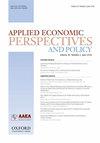关于轻推和心理抗拒
IF 3.4
2区 经济学
Q2 AGRICULTURAL ECONOMICS & POLICY
引用次数: 0
摘要
我们在实验室实验中测试了这样一种观念,即轻推可以鼓励人们选择更健康的食物,同时避免心理上的抗拒。我们试图复制一个众所周知的旨在减少零食消费的推动。我们的研究包括四个处理,前两个用于复制。在另一个条件下,参与者了解轻推的目的,并表现出典型的抗拒迹象。最后一个条件是测试轻推的商业可行性,衡量参与者对轻推产品的兴趣。大多数人更喜欢“轻推”产品,尽管这种“轻推”在这种透明的环境中失败了,这引发了人们对“轻推”在商业环境中的有效性的质疑。本文章由计算机程序翻译,如有差异,请以英文原文为准。
On nudging and psychological reactance
We test the notion that nudges can encourage healthier food choices while avoiding psychological reactance in a laboratory experiment. We attempt to replicate a well-known nudge intended to reduce snack food consumption. Our study consists of four treatments, with the first two used for replication. In an additional condition, participants learn the purpose of the nudge and show signs of classical reactance. A final condition tests the commercial feasibility of the nudge, gauging participant interest in a nudged product. A majority prefer a nudged product, though the nudge fails in this transparent context, raising questions about the effectiveness of nudges in commercial contexts.
求助全文
通过发布文献求助,成功后即可免费获取论文全文。
去求助
来源期刊

Applied Economic Perspectives and Policy
AGRICULTURAL ECONOMICS & POLICY-
CiteScore
10.70
自引率
6.90%
发文量
117
审稿时长
>12 weeks
期刊介绍:
Applied Economic Perspectives and Policy provides a forum to address contemporary and emerging policy issues within an economic framework that informs the decision-making and policy-making community.
AEPP welcomes submissions related to the economics of public policy themes associated with agriculture; animal, plant, and human health; energy; environment; food and consumer behavior; international development; natural hazards; natural resources; population and migration; and regional and rural development.
 求助内容:
求助内容: 应助结果提醒方式:
应助结果提醒方式:


